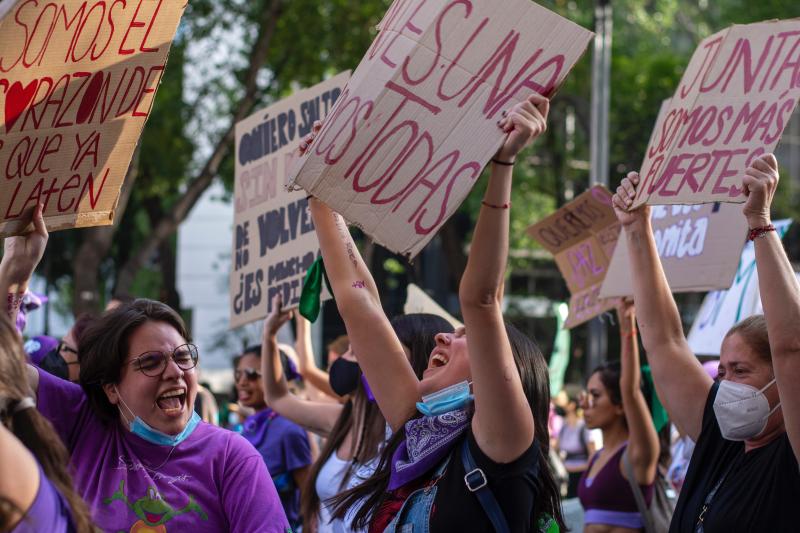Stay always informed
Interested in our articles? Get the latest information and analysis straight to your email. Sign up for our newsletter.

Women are suffering in poverty, being forced to make impossible choices to ensure people who are dependent on them can survive, while the corporations responsible for this crisis are overwhelmingly run by men.
By Lucy Hall, originally appeared in Euronews.
It’s not news that Europe is experiencing a cost of living crisis, the extent of which is almost unrivalled in recent history. Across the continent, people are suffering. Last summer, the phrase "heating or eating" was used to describe the desperation many were facing, but just a few months on, there is no longer an "or."
As energy bills skyrocketed, inflation increased, and governments around Europe are still scrambling for urgent solutions to help curb the crisis. But on the eve of International Women’s Day, there is a lesser-known story that should be told.
The crisis is affecting women badly in particular — much more so than men.
Women are suffering in poverty, being forced to make impossible choices to ensure people who are dependent on them can survive. And there's also the issue of gender inequality, too: the corporations responsible for this crisis are overwhelmingly run by men. In the end, it all boils down to a tale as old as time: that of the patriarchy.
In 2020, the gender pay gap was 13% in the EU. This means that women earn 13% less every single hour. It also means that for six weeks of the year, women work for free. In single-parent households — which are far, far more likely to be led by the mother (it is estimated that only 15% of single-parent households in the EU are fathers) — the pay gap can be felt even more acutely.
In 2021, before the crisis, over 20 million more women than men lived below the poverty line index in the EU. Whilst there are no more recent figures yet, the number will have undoubtedly risen since the Ukraine war. Late last year, a study by Eurofound showed that 44% of single mothers and 31% of single women anticipated difficulties affording energy costs over the coming months, compared to 26% of single men.
Women are suffering in poverty, being forced to make impossible choices to ensure people who are dependent on them can survive.
The European Sex Workers Rights Alliance (ESWRA) reported in October 2022 that "amidst housing shortages, economic stagnation and rampant inflation exacerbated by the Russian full-scale invasion of Ukraine, more people are set to turn to selling sex in order to keep a roof over their heads and feed their families."
In countries like Belgium, where sex work has recently been de-criminalised, this may not be seen as a problem, but for most sex workers in the EU, this kind of work is illegal and unsafe. The cost of living crisis also makes it harder for women to escape domestic violence, and they are more likely to be financially dependent on or tied to an abusive partner. And we’ve already seen how much harder it is for single women to survive.
The cost of living crisis is a direct outcome of the energy crisis. And the energy crisis has been exacerbated by the gas industry, which is now profiting from it and stopping us from tackling it. And guess who the majority of senior employees are? Yes, that’s right — men.
In October 2022, researchers at my organisation, Corporate Europe Observatory, produced a report revealing that oil and gas lobbyists enjoyed unprecedented access to European decision-making after Moscow's war against its neighbour.
As a result, a series of critical decisions on tax, energy infrastructure, and regulation have put fossil fuel industry profits above the interests of millions of people at risk of energy poverty in Europe.
At the end of 2022, it was widely reported that the five major oil and gas companies in the west — Shell, TotalEnergies, Chevron, Exxon Mobile, and BP — made record profits of over $195 billion (€182.9bn), 120% higher than the year before. All of these companies have male CEOs.
Other major companies that regularly meet with EU leaders are EDF, ENi Repsol and Vattenfall. While Vattenfall has a female CEO, the other two are men, meaning that, overwhelmingly, top executives of major energy companies are men.
But it doesn't have to be this way. There are solutions everywhere, and we just need to look for them.
But what about other senior staff?
Last year, the OECD published figures which showed women were even less represented in senior management positions in the energy sector than in general, with the figure hovering around a quite staggering 14%.
And then there are the lobbyists, the not-so-secret warriors of the energy market. Whilst there aren't numbers for the energy industry in particular, there are figures for lobbyists in the EU in general, and they tell a stark tale: 75% of lobbyists in Europe are men.
But it doesn't have to be this way. There are solutions everywhere, and we just need to look for them.
EmpowerMed —a project which looks at the gender justice elements of energy poverty— proposes a variety of measures ranging from the inclusion of women in energy and climate design to ensuring subsidised renovation and renewable programmes for female-led households.
In the meantime, governments in Europe would do well to provide safe havens for those women who are trapped with an abusive partner, affordable childcare for single mums, and ensure safety, protection and rights for sex workers who are trying to survive.
Maybe it sounds like a lot to do. But then, maybe men could use their six weeks extra pay to do it?